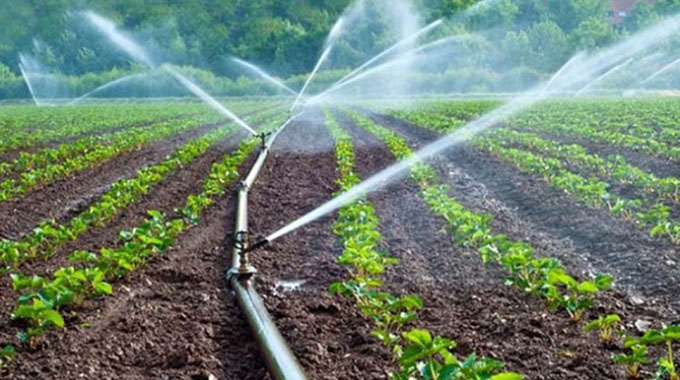Irrigation holds the key to agric productivity

Government’s move to revive irrigation schemes is essential in dealing with water shortages in farms and ensuring food sufficiency for the country.
Speaking during a tour of Mushandike Irrigation Scheme in Masvingo last week, Minister of State in the Office of Vice President Constantino Chiwenga, Dr Evelyn Ndlovu, said: “As Government, we are prioritising resuscitation of irrigation schemes in the country to ensure that we have enough food in the country.”
The major barriers affecting farmers are poor infrastructure on the existing irrigation systems resulting in food insecurity and low incomes for farmers.
Many of the crops grown in Zimbabwe are highly water dependent, for example, maize, sorghum, roundnuts and groundnuts, hence an efficient irrigation system is needed to complement rainfed farming.
Earlier this year, the country was hit by drought in most areas, hence, a perk up on irrigation systems is a welcome development in times when there is a shortage of rainfall or no rainfall at all.
Good irrigation schemes, complemented by the Presidential Input Scheme and Command Agriculture Programme, will go a long way in enhancing quality crop yields and improving water supply for small and medium holder farmers.
Many programmes have endorsed irrigation farming as a means to commercialise farms, for example, Command Agriculture, with funds targeted towards irrigation services.
Zimbabwe has more than 100 rivers and dams from which irrigation water can be channelled through new pipelines to farms.
According to Jacob et al (2013), barriers to productivity in Zimbabwe include inadequate inputs, unreliable and inadequate water delivery, due to weak water governance institutions and poor irrigation schemes to carry out good farming skills.
Many communities in Zimbabwe depend on crop production for survival; hence effective irrigation schemes are important in improving the agriculture sector and enhancing productivity on the farms.
Rainfall is not reliable in arid and semi-arid areas of the country, for example, Masvingo, making additional irrigation necessary for good crop yields.
Effective irrigation allows growing of crops throughout the year, including in off-season times when there is no rainfall.
In Silalatshani Irrigation Scheme within Insiza Rural District, water is transferred from the Silalabuhwa Dam to farms through lined mail canals.
However, the canals at the scheme were found to be leaking and they need repair to boost the agriculture sector.
The Fast Track Land Reform Programme was meant to empower Zimbabweans through ownership of their ancestral heritage. Sustainable farming should be enhanced through irrigation schemes.
Farmers, in partnership with the Government, should assume a leading role in improving water use for agriculture to bring change in farming systems through renovation, improvement and revival of irrigation schemes, thus enhancing productivity on the land.









Comments